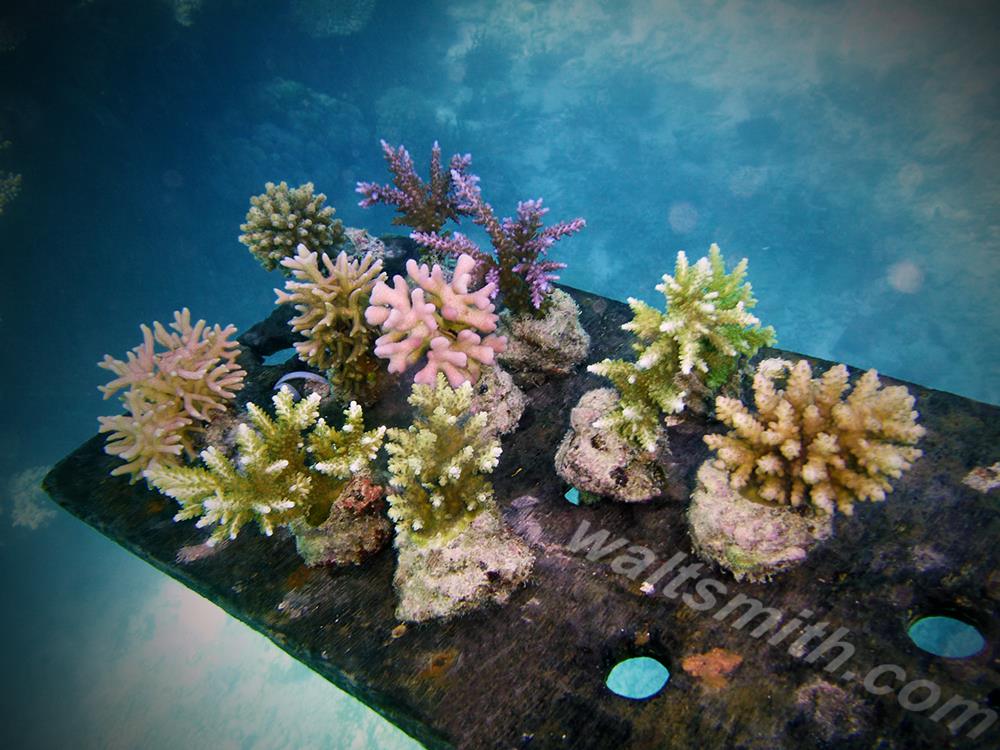
Maricultured Fijian corals are a staple offering of Walt Smith International, a flagship of the sustainable aquarium trade now in jeopardy following a surprising ban announced through social media.
January 5, 2018
The News: Fiji’s Ministry of Fisheries & Forests suddenly and unexpectedly bans coral and live rock exports with a Facebook post. Chaos ensues, with the future for the aquarium trade uncertain.
Stunned.
That probably best sums up the state of many marine aquarium enthusiasts, biologists, and other observers in the wake of a Fijian coral and live rock trade ban announced via Facebook by Fiji’s Ministry of Fisheries and Forests during the off-hours between Christmas and New Year’s Eve, 2017.
At stake? One of the most well-known and highly-regarded marine aquarium fisheries outside of Hawaii’s (which itself is apparently dead in the water for the moment), decades of work, ongoing privately funded coral restoration and replanting projects, hundreds of jobs, villages with vested interests in preserving their coral reefs, and a growing NGO coral reef restoration program (the A.D.E. Project), which had just received a major endorsement in the form of a 10K donation from another non-profit.
According to Fisheries Minister Semi Koroilavesau, there are multiple marine aquarium exporters actively operating in Fiji, “one in Labasa, one in Lautoka, and one in Nadi and also in Pacific Harbour.” His stated rationale for the surprise announcement was to protect coral reefs in the wake of news of calamitous bleaching events, especially on Australia’s Great Barrier Reef. The proposed ban would be a blanket ban affecting all coral exports, including those of sustainably farmed or maricultured small colonies and fragments.
Unintended Consequences
Exporters quickly pointed out that the new surprise policy would kill a great many jobs for native Fijians and result in the loss of important income to the island nation.
The ban, and subsequent public fallout, is largely playing out behind the scenes as a dialog between Walt Smith International (WSI), Fiji’s most prominent coral farmer and exporter, and the Fisheries Ministry, along with public discourse through social media updates and Fijian press interviews (see links at the end of the article). Stakeholders and industry watchdogs refrained from providing comment to CORAL at this time, leaving us only with the story that’s still unfolding publicly.
As of this posting, the staff at Lautoka-based Walt Smith International had plans to host Fiji’s Fisheries Minister this Saturday to better demonstrate the operation and discuss the Ministry’s actions and plan forward. The dialog is ongoing, although the wording of the initial ban was unflinchingly clear: come January 7th, a “zero” quota export threshold will be reported to CITES for 2018. Unless that’s changed, it might spell trouble for Fiji’s flagship and multiple-award-winning aquarium exporter, WSI.
In a recent elaboration, Koroilavesaue explained the motivation for the ban: “So what we are doing now in Fiji with the ban is based on the idea that a lot of coral reefs are dying, like the Great Barrier Reef in Australia, in which one-third of its corals are dying. Our commitment also means protecting the coral system and maintaining a healthy ocean, and that’s why we are doing it now. There is no set time for the ban period, but we will continue to monitor it and ensure that no trade activities of live coral happen during this ban period. We need to protect our marine resources, and we will stay committed to it.”

Walt Smith International, Fiji, celebrates over 20 years as a well-respected marine life supplier to the world.
Walt Smith: A fixture in Fijian business
In order to understand the utter shock resulting from this trade ban, it’s important to understand the history of Walt Smith International’s status and presence in Fiji. WSI is said to have enjoyed the strong support and respect of Fiji’s Fisheries managers for the better part of 20 years; the multi-million dollar business exists as a direct result of the Fisheries Ministry’s ongoing blessing and encouragement.
This, combined with Fiji’s international reputation for quality and sustainability, often touted as a best-choice option for marine aquarists seeking the ideal of “short supply chain” aquarium livestock, may explain why so many aquarists and industry professionals have been taken aback by the recent, seemingly “out-of-nowhere” ban.
Walt Smith International, Fiji, was founded in 1996 at the direct invitation of Fiji’s Ministry of Fisheries two years earlier in ’94. WSI has subsequently been repeatedly recognized as a leading company in Fiji. Awards include a 2007 International Ecotourism Award for the coral walk installed at Fiji’s Hideaway Resort, along with more prominent recognition, including the Fiji Export Council Unique Exporter Award in 2011, and Hangton Pacific Company Ltd Fisheries Exporter of the Year Award in 2013 (see image below).
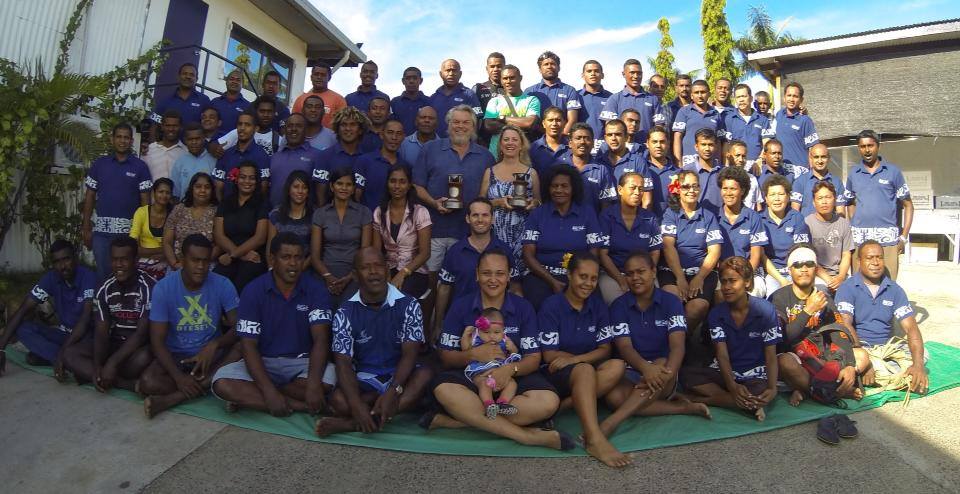
November 19th, 2013, the crew at Walt Smith International celebrates their “Fisheries – Exporter of the Year” award with a group photo. Per Walt Smith International: “Everyone is very proud to receive this award with all the hard work that has been put in.”
WSI was also granted a license to market fish, coral, and live rock under the Fijian Made-Buy Fijian campaign in 2014, and clearly had the support of the Fisheries Ministry, which requested the expansion of coral farming to northern regions of Fiji as early as 2011. WSI subsequently characterized this expansion to the Northern division as successful in a 2014 news report, with expansion to the western divisions also planned in 2014, and reportedly operating multiple coral farms and employing upwards of 140 people, as reported in 2017. In addition, reef restoration efforts under the A.D.E project have been replanting and restoring Fijian coral reefs since 2014.
The Public Story Unfolds
To understand this story, it’s best to follow it chronologically.
December 28th, 2017 – Fiji’s Ministry of Fisheries and Forests Bans Coral and Live Rock Exports
Many observers expressed dismay that a government agency would announce a major new policy first over social media. (Americans, it must be noted, now look to Twitter for headline-grabbing news, but for Fiji to use Facebook to reveal a ban that would impact the lives of so many has been a shock.)
The text of the ban reads:
The Ministry of Fisheries has banned all harvesting, purchasing, sales and export of live coral and aquarium rock (also known as live rock, coral rock or fossil coral) from the 28th of December, 2017.
All companies are to adhere to the following:
1. All harvesting, purchasing and sales of live rocks and live coral are now banned, and no export permits would be processed by the ministry.
2. The Convention in International Trade in Endangered Species (CITES) Scientific Committee (SC) will be submitting to the Management Authority (MA) on 7th January 2018 that Live Coral and Live Rock is given a zero quota for 2018.
3. The Ministry of Fisheries and both the CITES MA and SC would be supporting the development of other sustainable options, particularly the development of farmed or cultured coral.
ENDS
Subsequent news coverage of this announcement by the Fiji Times attributes the public posting to the department’s permanent secretary, Sanaila Naqali, and no additional comment could be obtained from the Fisheries Minister, Semi Koroilavesau.
As outsiders to the daily workings of Fijian Government, some most assuredly must have taken the posting of such a broad sweeping ban via social media to be a prank. But it quickly became clear that this was no joke.
December 29th, 2017 – Walt Smith International Acknowledges Ban
The next day, Walt Smith International published an in-kind response via Facebook:
Walt Smith International, Fiji would like to acknowledge the recent statement in the news related to the complete ban of collection and export of Coral and Live Rock. The Recent ban has come as a total shock to our company and the industry in Fiji. We only found out by a facebook post Friday morning and have not been legally notified of any bans currently in place.
Required protocol in matters like this are to consult with local industry before any actions are taken. We have been in contact with the local government and are working through the issues and future of the exports in Fiji but cannot comment further until work resumes on Tuesday January 2nd.
While this is potential roadblock for our company, we are confident that our business will continue.
We appreciate the concern and consideration for the reefs and sustainability in Fiji, and as WSI maintains a sustainable approach toward all our operations with our coral farms, reef replanting operations with the ADEProject.org, we have high hopes for a great sustainable future within Fiji.
Fortunately for WSI we have extended ourselves to be able to export our Man Made rock and Cultured corals, along with our wonderful Fiji Fish.
Walt [Smith], Deb [Smith] & Dave [Barrick]
Our 100+ Local Employees
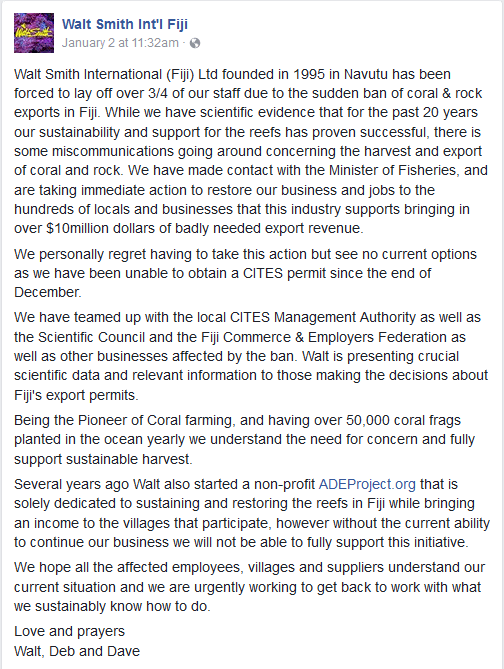
Walt Smith International announces the layoff of 75% of their main facility staff as a direct result of the ban.
January 2nd, 2018 – Walt Smith Lays Off Over 60 Employees
In a heartbreaking move for many employees, the New Year brought the type of news that most readers would dread: they’re out of a job.
This, not even two years after Cyclone Winston devastated Fiji, leaving many WSI employees without the basic necessities. WSI shared this news via Facebook:
Walt Smith International (Fiji) Ltd founded in 1995 in Navutu has been forced to lay off over 3/4 of our staff due to the sudden ban of coral & rock exports in Fiji. While we have scientific evidence that for the past 20 years our sustainability and support for the reefs has proven successful, there is some miscommunications going around concerning the harvest and export of coral and rock. We have made contact with the Minister of Fisheries, and are taking immediate action to restore our business and jobs to the hundreds of locals and businesses that this industry supports bringing in over $10million dollars of badly needed export revenue.
We personally regret having to take this action but see no current options as we have been unable to obtain a CITES permit since the end of December.
We have teamed up with the local CITES Management Authority as well as the Scientific Council and the Fiji Commerce & Employers Federation as well as other businesses affected by the ban. Walt is presenting crucial scientific data and relevant information to those making the decisions about Fiji’s export permits.
Being the Pioneer of Coral farming, and having over 50,000 coral frags planted in the ocean yearly we understand the need for concern and fully support sustainable harvest.
Several years ago Walt also started a non-profit ADEProject.org that is solely dedicated to sustaining and restoring the reefs in Fiji while bringing an income to the villages that participate, however without the current ability to continue our business we will not be able to fully support this initiative.
We hope all the affected employees, villages and suppliers understand our current situation and we are urgently working to get back to work with what we sustainably know how to do.
Love and prayers
Walt, Deb and Dave
January 3rd, 2017 – An Initial Meeting
Following an initial meeting with government officials, WSI shared the following update:
Our meeting with the PS and staff along with our support group went really well. They understand the position we are in and how our business operates as well as our sustainability efforts.
The minister would like to visit our facility to get a close up understanding of our full operations and be able to fully grasp how we work. We are hoping to have this meeting Saturday this week.
The good news is we have a temporary stay to continue exporting coral and rock that we left from 2017. What this means is any permits we applied for and were issued in 2017 we will be able to collect and ship out.
I will know more of what is going on in the morning And we are hopeful to have a resolution for the remainder of the year.
Discord Over Notification
While the Ministry of Fisheries claims that quotas were actively being reduced and that exporters were aware of this forthcoming closure for some time, WSI strongly objects to all these statements, noting that quotas have remained unchanged for years, and that no one at WSI was notified of the impending closure.
Public information reveals that after decades of support for the marine aquarium trade, Ministry sentiment may have shifted only weeks prior to the ban, as outlined in statements from the Ministry that were published November 29th, 2017, on the Fiji Times, and expanded subsequently on December 1st, 2017, on the Fiji Sun Online. These statements were the results of Fiji’s participation in the climate change conference COP23, held in Bonn, Germany, earlier in November.
Of note [emphasis added]: “Not forgetting the fact that having healthy coral reef ecosystems reduces 97 percent of wave energy and [they] act as barriers to storms and are the first line defence [sic] for coastal communities, preventing catastrophic erosion, flooding and destruction. In this regard, the Ministry of Fisheries had earlier decided that the harvest, sale, trade and export of live rock corals will cease. Noting that there are existing companies that currently export ornamental aquarium corals using a quota system, the Ministry of Fisheries is working closely with collaborating partners to further implement our commitment to the ‘coral declaration.'”
It’s highly conceivable that this public statement, published under the headlines of the Ministry adopting the CPO23 “Coral Reef Life Declaration,” may have been easily overlooked by trade participants, and yet may also be the basis for the Ministry’s assertion that the industry had been notified. The statement closes outlining the next steps, namely “Reflecting on the coral initiatives above, the Ministry of Fisheries will re-look at the current practices surrounding the harvest, sale and export of all coral species and the current sustainable factors that needs to be addressed through line Ministry’s, such as the Ministry of Environment as the Ministry responsible for all CITES listed products.” [All international trade in stony corals is monitored and governed by CITES.]
The Ministry’s Further Explanation of the Ban
Cutting through all the confusion and mixed messages in the mainstream media, the most recent reports from the Fiji Times on January 3rd and 4th, 2018, paint a pretty clear picture. Taking the latest statements at face value, it appears that the path going forward in Fiji is likely to be strictly some form of aquacultured and/or captive-bred corals and man-made, ocean-cultivated live rock. However, there is no publicly-disclosed plan or timetable to enact this change, only the current ban. According to the current WSI website, cultured corals and live rock represent about 20% of their total export volume; the remaining 80% consist of wild-harvested live rock (now banned), wild-harvested corals (now banned), and wild-caught fishes.
In statements published on 1/3/18, Fisheries Koroilavesau remarked, “[Three major companies] have already contacted our office and want to discuss this issue, because they are now aware of the ban. We have been going through consultations, and will discuss with the companies their concerns and issues. But we will also look at having these companies starting their own coral farms so they can export the coral from their own farms. We will set alternatives for these companies, but if they do their own coral planting and harvest it, then they can export it. So this ban will ensure our coral system is protected always.”
The following day, more position statements were put on the record, attributed to Koroilavesau. “[The exporters] employ people, but we will look at alternative sources of income. We cannot close down these factories, but we will ban the exports of it (live coral). We are consulting with them (the exporters). We can come and discuss what alternatives there are, and if it’s possible for them to stop breaking from corals and actually grow their own corals. If they grow their own corals, to actually farm corals, then we can monitor that and allow them to do it, but breaking from the live corals we want to put a stop to that [Ed. presuming ‘breaking from the live corals’ is meant to be the harvest of wild corals for direct export.] We are not going to provide employment, but we can provide proposals for alternative fisheries so that they can go into business again…They can say that the return [on aquaculture, implied – Ed.] is not as good, but there are alternatives to what they are doing now. We cannot continue what we have been doing in the past and ignore the facts.”
Jargon Issues and an Uncertain Future
While the most recent statements suggest that mariculture is permissible in the eyes of the Fisheries Ministry, the realities are a bit more complicated. In an interview with the Australian Broadcasting Corporation (ABC), Koroilevesau relayed that “The ban is the harvesting of live coral from our reef system…If the exporters are actually breeding their own coral then it will not affect them.” And yet, there is also the publicly stated “zero” export quota planed for 2018, which directly conflicts with the minister’s statement.
In the same ABC story, Walt Smith International’s Livestock and Aquaculture Manager, Dave Barrick, noted that currently, WSI’s maricultured corals start as frags taken from wild broodstock; WSI’s mariculture (as it is currently performed) is tied to sustainable wild harvest, effectively fragging wild corals for off-reef grow out. It seems this specific practice would no longer be permitted, which perhaps demonstrates a fundamental lack of understanding on the Ministry’s part. Mariculture operations including WSI are required to outplant more farmed corals than they export, the net result being sustainable culture, reef replenishment, and restoration, not diminishment or over-harvest.
Furthermore, the actual “breeding” (sexual propagation) of corals, as Koroilevesau discusses with the ABC, is likely not something that any of the coral exporters in Fiji are prepared to accomplish. “The cost and investment behind [breeding coral] is not really manageable by anybody, but universities trying to do research on it,” Barrick told the ABC.
There may be some confusion with the jargon being used by Minister Koroilevesau, as coral breeding and coral farming are not the same thing, but it appears they’re being used rather interchangeably in press accounts of interviews with the minister.
It remains to be seen how Koroilevesau and Fiji’s coral exporters will work together in the coming weeks. Barrick’s stated goal is “sort of a grace period to phase out over so many months [or] years, instead of an immediate ban on our company.” It appears that the parties involved are intent on a path forward that puts hundreds of Fijians back to work and doesn’t kill off one of the most highly-regarded aquarium fisheries on the planet, but time may be of the essence if a wounded aquarium export industry is to recover.
Image Credits: All images courtesy Walt Smith International unless otherwise noted.
Ban-related External Online References, Chronologically:
Official “Ban” Announcement on Fijian Facebook Page, 12-28-17: https://www.facebook.com/fisheriesfiji/posts/1501326856649871
Walt Smith Public Reaction, 12-29-17: https://www.facebook.com/waltsmith.fiji/posts/2223652557651871
Fiji Sun Coverage of The Ban, 12-30-17: http://fijisun.com.fj/2017/12/30/harvest-export-of-live-coral-now-banned-ministry/
Dr. Bruce Carlson Letter to Government of Fiji: https://www.reef2rainforest.com/2018/01/05/conservation-biologist-reponds-to-fijis-coral-export-ban/
Walt Smith Layoff Announcement, 1-2-18: https://www.facebook.com/waltsmith.fiji/posts/2228170477200079
Fiji Layoffs covered by Fiji Sun, 1-3-18: – http://fijisun.com.fj/2018/01/03/over-60-workers-laid-off-from-coral-company/
Holding Pattern (ABC Australia), 1-3-18: http://www.abc.net.au/news/2018-01-04/fijis-coral-exporters-await-clarification-after-ban/9302496
Coral Ban To Protect Dying Reefs, 1-3-18: http://www.fijitimes.com/story.aspx?id=429398
Minister, Exporters Exploring Options, Fiji Times, 1-3-18: http://www.fijitimes.com/story.aspx?id=429406
Walt Smith Initial Meeting Followup, early AM 1-4-18: https://www.facebook.com/waltsmith.fiji/posts/2229976567019470
Short Coverage of the situation from New Zealand, 1-4-18: http://www.radionz.co.nz/international/pacific-news/347470/fiji-discusses-coral-farms
Coverage of the Layoffs from the BBC, 1-4-18: http://www.bbc.com/news/blogs-news-from-elsewhere-42564653
Coral Farm Option from the Fiji Times, 1-4-18: http://www.fijitimes.com/story.aspx?id=429564
More Discussions to occur, from Fiji Village, 1-4-18: http://fijivillage.com/news/Ministry-of-Fisheries-to-have-consultations-with-aquarium-companies-and-exporters-of-live-coral-k9s25r/
Disclosure: Walt Smith International is an advertiser with CORAL Magazine. This relationship has not been leveraged in any manner to bias the content or tone of our editorial reporting.
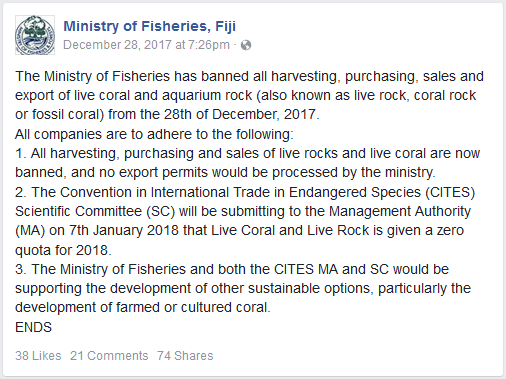
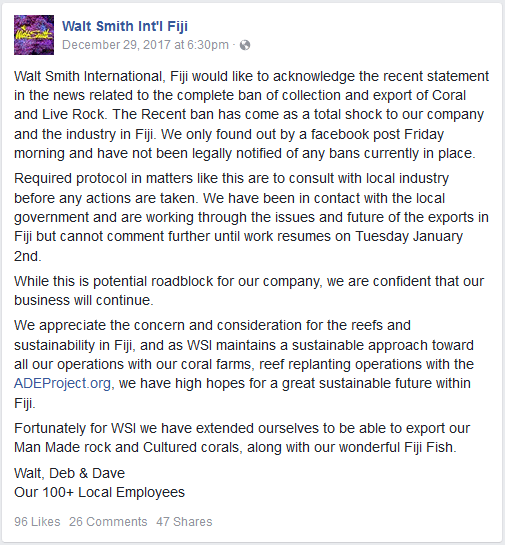
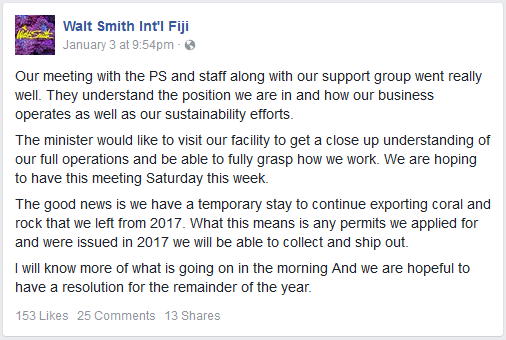
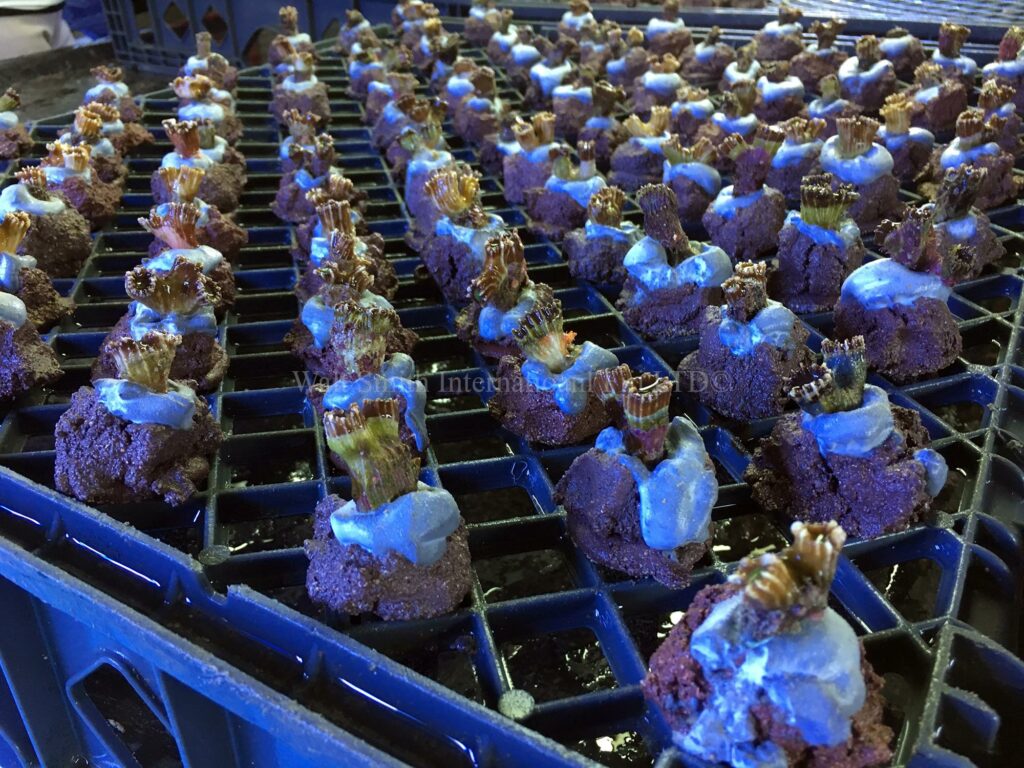
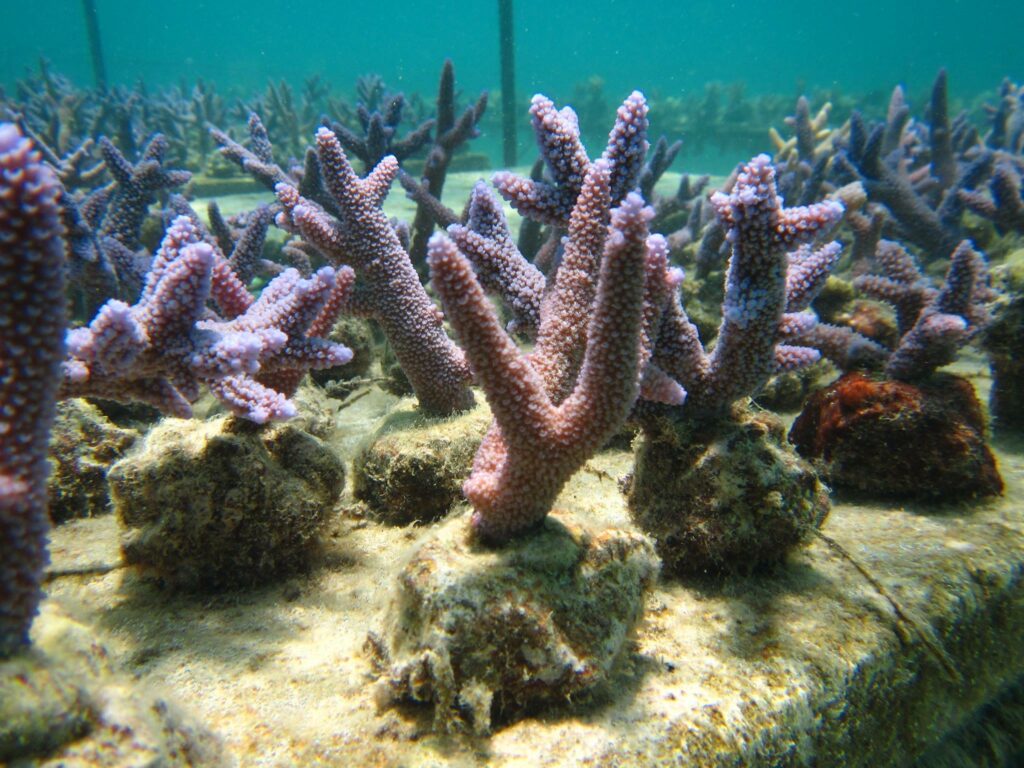





Better to grow than exploit it.
Which is what was already happening. Eg. http://www.fijitimes.com/story.aspx?id=264624
Still only doing 20% should be 50 to 60% by now, growing to 100% in a few years.
Hello.. can you send coral to swizerland?
Scabell, best bet would be to reach out to Walt Smith International to see if they’re currently able to export to Switzerland (it should go without saying that WSI is explicitly an exporter to the aquarium trade so if you’re a hobbyist best to seek out coral retailers in your native country). You can find WSI at http://www.waltsmith.com/. It’s worth noting that after 2+ months, FIJI lifted the ban on the coral and live rock trade earlier this month. See more at https://www.reef2rainforest.com/2018/03/08/after-70-days-fiji-coral-trade-ban-is-lifted/